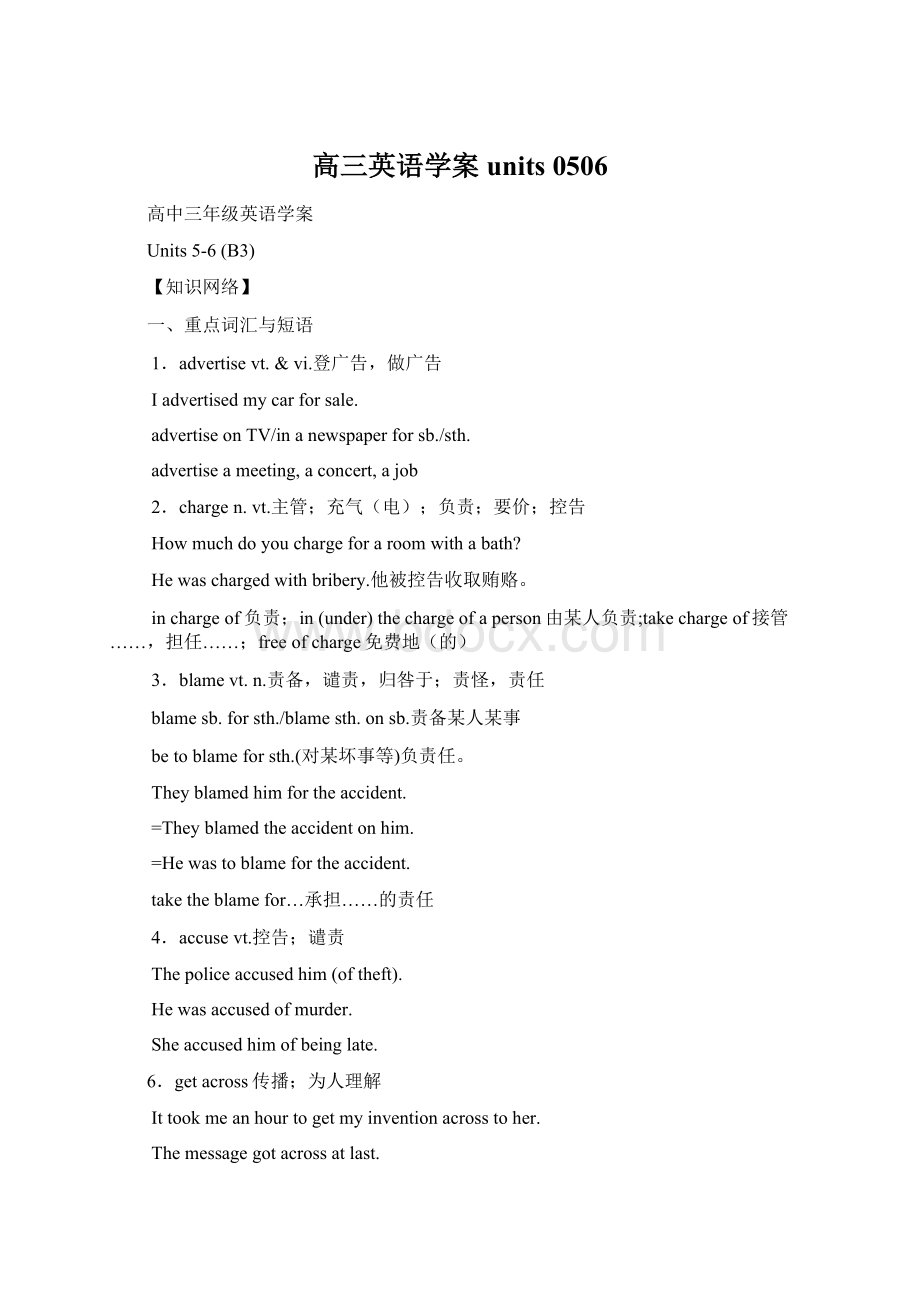高三英语学案units 0506.docx
《高三英语学案units 0506.docx》由会员分享,可在线阅读,更多相关《高三英语学案units 0506.docx(13页珍藏版)》请在冰豆网上搜索。

高三英语学案units0506
高中三年级英语学案
Units5-6(B3)
【知识网络】
一、重点词汇与短语
1.advertisevt.&vi.登广告,做广告
Iadvertisedmycarforsale.
advertiseonTV/inanewspaperforsb./sth.
advertiseameeting,aconcert,ajob
2.chargen.vt.主管;充气(电);负责;要价;控告
Howmuchdoyouchargeforaroomwithabath?
Hewaschargedwithbribery.他被控告收取贿赂。
inchargeof负责;in(under)thechargeofaperson由某人负责;takechargeof接管……,担任……;freeofcharge免费地(的)
3.blamevt.n.责备,谴责,归咎于;责怪,责任
blamesb.forsth./blamesth.onsb.责备某人某事
betoblameforsth.(对某坏事等)负责任。
Theyblamedhimfortheaccident.
=Theyblamedtheaccidentonhim.
=Hewastoblamefortheaccident.
taketheblamefor…承担……的责任
4.accusevt.控告;谴责
Thepoliceaccusedhim(oftheft).
Hewasaccusedofmurder.
Sheaccusedhimofbeinglate.
6.getacross传播;为人理解
Ittookmeanhourtogetmyinventionacrosstoher.
Themessagegotacrossatlast.
7.attachvt.系;贴;附加;认为有(重要性等)
attachsth.tosth.把某东西系到某东西上
attachyourselftosb./sth.加入;使隶属于
beattachtosb./sth.依恋;留恋
8.makesense有意义,有道理,讲得通
Thissentencedoesn?
tmakesense.
Itmakessensetotakecareofyourhealth.
Canyoumakesenseofwhatthiswriterissaying?
commonsense常识;ina(some)sense在某种意义上
Thereisnosenseindoingsth.(做某事)没道理
9.keepup维持,保持
Ihopetheweatherwillkeepup.
Thenoisekeptupforallnight.
Thegoodnewskeepourspiritup.
Howdoyoukeepthislargehouse?
keepaneyeoutforsb./sth.留心或注意某人/物
keepaclosewatchon密切注意
keepawayfrom避开,离开;keepback防止,隐瞒
keepon继续;keepoff…离开,使不接近
keepout(of)不进去,置身于……外,从……离开
keepupwith跟上,不落后;keepintouchwith保持联系
10.beyond①prep.在……的那边,远于;超过
Ican’tseeanythingbeyondtheriverbecauseoffog.
Heissuchanaughtyboyandisbeyondmycontrol.
Don’tstayoutbeyond10o’clockatnight.
②adv.在更远处;再往后
Fromthetopofthehillyoucanseealakebeyond.
二、词义辨析
1.each与every
each强调“个体”,every强调“整体”,every只有一个词性,形容词,且every不接of短语,every只作定语,而each作定语,主语,宾语,同位语。
如:
Each/Everypupilwasgivenapencil.每个学生发一枝铅笔。
EachofushasaChinese-Englishdictionary.
我们每人都有一本汉英词典。
2.spend,cost,pay,charge与offer
这几个词都表示“花费(金钱)”,但用法不一样。
(1)cost是以“物,事”为主语,常用于sth.cost(sb.)somemoney结构。
Thecostcosther20yuan.这件外衣花了她20元。
注意:
cost无被动语态。
(2)pay用于付款给别人,付一个帐单或者付几笔款项等,它是及物动词,宾语可以是“人”或“钱”的名词或代词。
Yesterdayhepaidthemoneyheowed.他昨天还清了欠账。
(3)charge指收取别人多少钱,主语为人或旅馆等。
Thehotelchargedme£10foraroomforthenight.
那家旅馆一间房一晚向我收费10英镑。
(4)offer出价,开价;提供,出售,“人”作主语。
Weofferedhimthehousefor£1000.我们要价1000英镑卖给她那幢房子。
比较:
Weofferedhim£1000forthehouse.我们出价1000英镑买他那幢房子。
3.setoff,setout与setabout
(1)setoff有“启程;出发”的意思,还可作“引起;使爆炸”解(例略)
(2)setout的意思是“开始;着手”后常接动词不定式。
如:
Hesetouttopaintthewholehouse.他开始着手粉刷房子内外。
(3)setabout的意思也是“开始;着手”但常接动名词作宾语。
如:
Shesetaboutdoingsomecleaningafterbreakfast.她用过早餐后立即着手打扫卫生。
三、重点句型
1.Youthinkthenewspaperistoblameforthisbecause…
你认为因为这件事报社应受责备……
注意toblame=shouldbeblamed应受责备。
如:
Whoistoblameforbreakingthewindow?
谁应为打破窗子而受责?
2.Ithasbeenprovenagainandthatfrequentadvertisingincreasesproductsales.
事实已经一次次地证明经常做广告增加了产品的销售量。
Itis(hasbeen)proven已被证明(后接that句)
Ithasbeenproventhatmorethan2000peoplediedinthewar
已经被证实多于2000人死亡于这场战争。
类似表达有:
Itis/washoped/said/announced/reportedthat……
人们希望/据说/已宣布/已报导……
Itissaidthatthegirlhadbeenbadlytreatedwhile
shoppingyesterday=Thegirlissaidtohavebeenbadly……
Itishopedthatwe’llhaveabrighterfuture.
ItwasannouncedthatRussiasentupanotherman-madesatellite.
3.Notalladsareusedtopromoteaproductortoincreaseacompany’sprofits.
并非所有的广告都被用来推动产品的销量,或增加公司的利润。
Notall=allnot并非所有的(部分否定),此句也可写为:
Alladsarenotusedtopromoteaproductortoincreaseacompany’sprofits.all的全部否定为none或nothing
Noone.类似的还有both,each,notboth(each)=both(each)
Not均为部分否定,both全部否定为neither,each全部否定为none,noone,nothing。
如:
Notallthestudentssmoke=Allthestudentsdon’tsmoke
并非所有的学生都吸烟。
Noneofuslikethatsong我们一个也不喜欢那首歌。
四、语法复习
1.宾语补足语
(一)宾语补足语的定义
英语中有些及物动词,除了一个直接宾语以外,还要有一个宾语补语,才能使句子的意义完整。
这类常用的及物动词有:
make(使),consider(认为),cause(引起),see(看见),find(发现),call(称为,叫做),get(让,使得),have(让,使得),let(让)等。
如:
Electricitycanmakeamachinerun。
电能使机器运转。
Weconsider(或think)theanswer(tobe)correct.我们认为这个答案是对的。
Whathesaidmademeveryangry.他的话使我很生气。
(二)宾语补足语的表现形式
带有宾语补足语的一般句型为:
某些及物动词(如make等)+直接宾语(名词或代词)+宾语补足语。
宾语补足语在句中的9种表示法:
(1)用名词(包括名词性物主代词)表示
HisfathernamedhimTom.他父亲给他取名汤姆。
WeconsiderMrZhanganexcellentteacher.我们认为张先生是位优秀的老师。
(2)用形容词及其短语表示
Theypaintedtheirboatwhite.他们把船漆成了白色。
Webelievedthereportuntrue.我们确认这个报告不真实。
Isawhimyoungandstrong,andnowheisoldandworn.
我看到他的时候,他年轻强壮,现在他已年老体弱。
(3)用不定式及其短语表示
Youmustn’tforcehimtolendhismoneytoyou.他不应该强迫他借钱给你。
Nobodynoticedhimentertheroom.没有人注意到他进了屋子。
注:
see,have,let,make,watch,notice,hear,observe等动词后的宾语补足语用不定式表示时,不可加to。
help后的不定式可带也可不带to。
(4)用现在分词及其短语表示
Wesawherenteringtheroom.我们看见她正走进那个房间。
IheardhersinginganEnglishsong.我听见她在唱英语歌曲。
(5)用过去分词及其短语表示
TheyfoundGuilingreatlychanged.他们发现桂林变化很大。
Atthattimewewerethereandsawitdone.那时我们在那儿,并看见这事被做完。
注:
过去分词作宾语补足语时,宾语和它的关系是被动关系。
(6)用as引出宾语补足语
WetakeEnglishasausefultoolforresearchwork.
我们把英语当作研究工作的一种有用的工具。
Ilookuponhimasmyteacher.我把他看成我的老师。
(7)用介词短语表示
Wefoundeverythinginthelaboratoryingoodorder.
我们发觉实验室内每件东西都放得井井有条。
Wheneveryoumaygo,youwillfindhimatwork.
不论什么时候去,你都可以看见他在工作。
(8)用副词表示
Letthefreshairin.让新鲜空气进来。
Isawhimoutwithhisfather.我看见他和他父亲外出了。
(9)用从句表示
Wewillsoonmakeourcitywhatyourcityisnow.
我们不久就要把我们的城市发展成你们城市目前的那个样子。
Theplanthasitsownname.Youcannotcallitwhatyouwill.
这种植物有自己的名称。
你不能随便称呼它什么。
注:
能在复合宾语中先用形式宾语it,然后再用真正宾语的动词并不多,常见的有think,find,consider,judge,feel,make,take等。
Theythoughtitrighttodothistest.
他们原以为做这项试验是对的。
(后面不定式为真正宾语)
Weallthinkitourdutythatweshouldsupporthim.
我们都认为支持他是我们的职责。
(后面从句是真正宾语)
Wefinditnecessarytomasteraforeignlanguage.
我们认为掌握一门外语是有必要的。
(后面不定式短语为真正宾语)
2.定语
(一)定语的定义
修饰名词或代词的词、短语或从句称为定语。
(二)定语的表现形式
定语一般可由形容词、分词(短语)、名词、代词、数词、名词所有格、不定式、动名词、介词短语、副词和从句等充当。
(1)形容词
Guilinisabeautifulcity.桂林是一座美丽的城市。
Abrightfutureshinesbeforeoureyes.光照的未来展现在我们眼前。
(2)分词(短语)
Chinaisadevelopingcountry;Americaisadevelopedcountry.
中国是一个发展中国家,美国是一个发达国家。
Whoisthemanshakinghandswithourteacher?
和我们老师握手的那个人是谁?
Thisisthebridgebuiltlastyear.这是去年建的那座桥。
(3)名词
Therearethirtywomenteachersinourschool.我们学校有30名女教师。
Theyaregoingtoputupawallnewspapernextweek.他们打算下周出墙报。
(4)代词
HisrapidprogressinEnglishmadeussurprised.
他在英语方面的快速进步使我们很吃惊。
DoyouknowthestudentwhoseEnglishpronunciationisthebestinyourclass?
你知道你们班上英语发音最好的那个学生吗?
(5)数词
Morethanthirtystudentsinourclasshavereadthebook.
我们班三十多个学生读过这本书。
Theteacheraskedthestudentstocopythethirdparagraphofthetext.
老师让学生抄写课文的第3段。
(6)名词所有格
Youshouldfollowthedoctor’sadviceanddomoreexercises.
你应该听从医生的建议,多运动。
Mary’sparentshavegoneabroad.玛丽的父母出国了。
(7)不定式
Ourmonitorisalwaysthefirsttoentertheclassroom.
我们的班长总是第一个走进教室。
Ican’tgowithyou.Istillhavealotofworktodo.
我不能和你去。
我仍有许多工作要做。
(8)动名词
Theteachingplanfornexttermhasbeenworkedout.
下学期的教学计划已制定好。
Youmustn’ttakethemagazineoutofthereadingroom.
你不要把杂志带出阅览室。
(9)介词短语
HeisreadinganarticleabouthowtolearnEnglish.
他正在读一篇有关如何学习英语的文章。
Whoisthegirlinred?
穿红衣服的那个姑娘是谁?
(10)副词(多位于被修饰词之后)
Anoiseoutsidemadehimturnaround.外面的喧闹声使他转过身来。
Themanintheroombelowisfriendly.楼下房间的那人很友好。
(11)从句
Thereisnothingthatworrieshim.没有什么事使他烦恼。
IwillrememberthedaywhenIfirstmether.我将记住第一次遇见她的那一天。
注:
如果作定语的是形容词、代词、名词等,通常位于所修饰的词之前,但如果作定语的是介词短语或动词不定式,则位于所修饰词之后。
如:
Herfatherisafamousdoctor.她父亲是个著名的医生。
(代词、形容词作定语)
I’vegotanimportantmeetingtoattend.我有一个重要会议要参加。
(形容词、动词不定式作定语)
Peopleintheparkwereenjoyingthewarmsunshine.公园的人正享受着暖和的阳光。
(介词短语、形容词作定语)
【考点透视考例精析】
[考例1]Itshamesmetosayit,butItoldaliewhen______atthemeetingbymyboss.
A.questioningB.havingquestioned
C.questionedD.tobequestioned
[解析]C 本题考查分词用法。
when+分词(doing/done)作状语,questionvt.“对……提出疑问”,相当于whenIwasquestioned。
[考例2]Ifyoucan’tcometomorrow,we’ll______havetoholdthemeetingnextweek.
A.yetB.evenC.ratherD.just
[解析] D yet作“还”讲常置于句末,even“甚至”,rather“相当”,语义不符语境。
just(口语)用以加强语气,“甚至”之意,故选D。
[考例3]----Howlongareyoustaying?
----Idon’tknow._______.
A.That’sOKB.NevermindC.ItdependsD.Itdoesn’tmatter
[解析]C本题考查交际用语与惯用法。
It(just)depends是口语,意思是说“看看再说,视情况而定”合乎题意。
其他几个不符语境。
[考例4]Itwasnotaseriousillness,andshesoon______it.
A.gotoverB.gotonwithC.gotaroundD.gotoutof
[解析]A本题考查动词短语用法辨析。
A项意为“从(病、损失等)中恢复过来”。
B项是“与……相处”或“某事进展如何”。
C项为“(在某处)走一走,看一看”。
D项为“逃避,追逐放弃”。
根据句意,应选A项。
【基础演练】
一、据首字母(汉语提示)填词,完成句子。
1.Wewerereadytothetheb______forwhathadhappened.
2.Iwas______(烦)withhimbecausehekeptinterrupting.
3.Thescientistdecidedhedidn’twanttobea______withtheproject,andleft.
4.Wesoldourhouseata______(利润).
5.Howdidhe______(反应)toyoursuggestion?
6.Sheboretheb______ofcaringforhersickmother.
7.Willthismedicinegiveimmediater_____frompain?
8.Thechildcan’tusechopsticksp______.
9.Shewasd______ofahealthbady.
10.Theycelebratedtheir10thwedding______(纪念).
二、单项选择
1.Hehasagoodthermometerwhich______changesintemperatureveryquickly.
A.reactsagainstB.reactswithC.reactstoD.reactson
2.Itisratherdifficulttoguesswhather______wouldbewhenwetellherthenews.
A.methodB.reactionC.impressionD.comment
3.Policehave______tothepublictocomeforwardwithanyinf